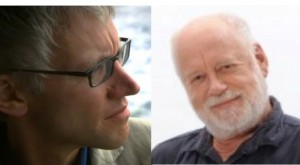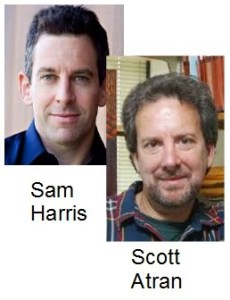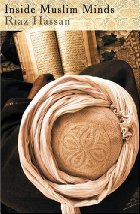As if on cue — given some recent discussion and a significant point of my previous post . . . .
HT ICH . . . .
Musings on biblical studies, politics, religion, ethics, human nature, tidbits from science
Distinct from Biblical Studies. Includes studies in origins and nature of religious ideas; posts on religions in history and contemporary world (e.g. Buddhism, Hinduism, Islam, Judaism.) Should this include post-biblical Christianity and rabbinical Judaism of late antiquity, the direct outgrowths of Second Temple era? Also includes various types of Christianity (e.g. fundamentalism) and debates with atheists. Posts on atheism and atheist world views per se are also included, of course. It does not include Islamism as the matrix of terrorism — that goes into Politics and Society. But here we get into a grey area. Compare social attitudes towards and criticisms of Islam related to Islamism and terrorism.

As if on cue — given some recent discussion and a significant point of my previous post . . . .
HT ICH . . . .


Only a day after posting the John Meier’s Nixon/Thales fallacy, as if right on cue Larry Hurtado has posted his own version of a similar fallacy, a comparison of the evidence for Buddha with that for Jesus.
Recall the Nixon/Thales comparison fallacy:
When John Meier in his opening chapter of volume one of The Marginal Jew discusses the “basic concept” of “The Real Jesus and the Historical Jesus” he creates the illusion of starting at the beginning but in fact he leaves the entire question of historicity begging.
Owens identifies what Meier has done in making such comparisons (my bolding in all quotations):
An implication exists in the double comparison, which is that Jesus is as real as Nixon and as historical as Thales but the explicit point is that there is less ‘reality’ data on Jesus than on Nixon, and as meager ‘historical’ data on Jesus as on Thales.
We note that what we might consider the “first question” of any book purporting to deal with the issue of a ‘historical Jesus’ – the question of whether or not Jesus existed — is being set up to go begging. ‘Reality’ is impossible, and ‘history’ is impossibly difficult, so we are to assume both, as we do with Nixon and Thales.
(Owens, Clarke W. (2013-07-26). Son of Yahweh: The Gospels As Novels (Kindle Locations 216-221). Christian Alternative. Kindle Edition.)
See how Larry Hurtado has fallen into the same implicit fallacy with his Buddha comparison: Continue reading “The Buddha Comparison Fallacy in HJ Studies”

 If anyone was upset at Reza Aslan’s book Zealot, a fairly tame view of Jesus by standards of orthodox biblical studies, they will self-destruct when they hear about another Muslim’s take on Jesus. . . .
If anyone was upset at Reza Aslan’s book Zealot, a fairly tame view of Jesus by standards of orthodox biblical studies, they will self-destruct when they hear about another Muslim’s take on Jesus. . . .
Agron Belica has already written The Crucifixion: Mistaken Identity, John the Baptist and Jesus the Christ. This work was preceded by a warm-up preface of sorts: Deliver a Messiah: Mistaken Identity. The book being advertized through Salem-News is The Passion of the Baptist, Not the Christ.
It’s interesting to look at the way the book is being promoted. I first was made aware of it through Gilad Atzmon’s regular newsletter. His blog post repeats what that contained. Atzmon finds it interesting just as Richard Dawkins was interested to hear Joseph Atwill’s thesis on the Roman invention of Christianity. It’s a harmless curiosity. I don’t believe either of these men will take either of these ideas and shout them from rooftops with conviction. They’ll simply take them as an interesting set of ideas to speculate about.
That won’t stop Fox interviewers or mainstream biblical scholars and theologians from going ballistic, however. If any of them take notice I can hear already their offended cries: But Agron Belica is not one of us! He is not trained in our schools! Therefore he is not qualified to write what he does and we think everyone should scoff at the book and insult its author and avoid reading it.
What is different about this work is that it is apparently based on a study of three pillars:

Better to be a latecomer to the best on the net than never to discover it at all. Since learning more about Tim Minchin (hear/view the last half of the videoclip — from 11:55 on — in the video I added to the Kick Joe Atwill Week post in which Tim is awarded his honorary degree of Doctor of Letters) I have decided to seek out and watch much more of Tim Minchin to see why he is acclaimed a genius in music and comedy.
[youtube=”http://www.youtube.com/watch?v=HhGuXCuDb1U&feature=player_detailpage”>http://www.youtube.com/watch?v=HhGuXCuDb1U&feature=player_detailpage]
To see the lyrics and another presentation (more personally direct) of this work . . . . Continue reading “Beat Poem to Share with Critical Thinker / Sceptically-Minded Friends”

[youtube=http://www.youtube.com/watch?feature=player_detailpage&v=IZeWPScnolo]
Lyrics . . . . Continue reading “Thank You God — Tim Minchin”

What a shameful week this has been. Three bloggers, Tom, Dick and Larry, have gone out of their way to heap personal attacks on Joseph Atwill, ostensibly in order to distance themselves from his views. What’s worse is that two of those bloggers have regularly censured the biblical studies and theology establishments for resorting to personal insults upon those who attempt to make a case for the Christ Myth theory — “intellectual bullying”, “verbal intimidation”, “unprofessional”, “shameful”, are said to describe this proclivity.
Clearly the abusive personal insults they have flung at Joe Atwill indicate these bloggers have no interest in winning over anyone sympathetic to Joe. So why do they do it? I can imagine two possible reasons:
None of this personal abuse is necessary. It only makes the perpetrators look as sick as the academic hypocrites they criticize for spewing the same types of ad homina against them.
This is comes with the free-speech we enjoy, but the original idea behind the ideal of free speech was that the best or truest ideas would eventually rise to the top as everyone had an opportunity to hear the arguments for and against them all. Our innate reasonableness would lead to the most reasonable ideas winning out in the end. But we can now see that Tom, Dick and Larry are just as prone to resorting to intellectual intimidation as those they criticize. Intellectual bullying was not the way a free speech society was meant to work.
But what if someone really is bonkers?
I think the Atlantis theory is bonkers. But if I were addressing someone who believed it I would not insult them by saying they were bonkers. If I felt it worth the effort I would argue the case just as soundly as I would expect an evolutionary biologist or palaeontologist to argue against Creationism with a fundamentalist. In fact, it was indeed because I discovered that someone I considered a friend did believe in the Atlantis myth (and a few other oddities besides) that I did take the time to do a bit of homework and make a serious effort to present a reasoned and evidence-based case against those ideas. One of them I eventually posted here. I don’t believe any of that effort was wasted. What would have been wasted would have been any energy expended in calling my friend a crackpot.
There is a place for certain kinds of language and expression. I do not speak at work planning meetings the same way or with the same language I use after work with friends over a few beers. I do not write policy or information sharing documents for work in the same language I use when expressing personal work frustrations with a trusted colleague. We have evolved to be social beings and we need to refine and maximize our social skills to the utmost if we want to achieve the best possible outcomes in the wider social context.
Now I think a number of readers here know I do not agree with the views of Acharya S. (D.M. Murdock). I have attempted to argue against her views and those of Robert Tulip on this blog. At no time did I utter a personal insult against either. Nor did I provocatively call their views “cow scat”. I did attempt to strictly address specific claims, words used, arguments made — and for my pains I was slandered like nobody’s business on the discussion forum of Acharya S. One does not argue against her or her followers in public and get away with it. I soon lost interest in continuing to argue my reasons for rejecting her thesis. I guess I let her win. She proved that personal insult and abuse can silence critics. Maybe I should continue.
There is much more to be said here (and yes, those in positions of power and responsibility should be held to higher standards than others), but I’ll save a more detailed discussion of the state of much of academia for another post.
Back to these “Let’s kick Joe Atwill” types.
The first of these personal attacks came from Tom. He calls Atwill’s documentary (“what you are watching”) “golden cow scat”. He critiques the entire film before he has seen it (he only concedes that Joe Atwill has “apparently” made a documentary film) entirely from the blurb itself. Any blurb is, by definition, an attempt to persuade you to read or view the contents by suggesting they are something new and different. The blurb is not the argument itself. But that doesn’t stop Tom from writing an entire critique of what he calls the blurb.
If you are planning to go see this movie, please, bring a disposable bag so you can properly rid yourself of the dung that undoubtedly will be thrown at you during the presentation.
Now that’s a profound intellectual argument!
The personal character and mind-reading attacks continue:
Atwill clearly has no grasp of these concepts, probably because he didn’t bother reading anything related to this despite his self-acclaimed ‘bookish-ness’.
Like all sensationalist crap-dealers, Mr. Atwill claims to have discovered the secret, super-dooper, hidden code in the text. Amazing! I (sic) self-proclaimed “Biblical scholar”, with nor formal training in the material, has used his magic decoder ring and stumbled upon a code! How clever of him.
In the Dead Sea Scrolls, which Mr. Atwill seems to think he knows so well. . .
It is just so beyond absurd. It really is.
Here is the thing. It may be that Mr. Atwill is completely clueless about this. Maybe he isn’t just trying to scam everyone and sell a bunch of books to a group of gullible people. Maybe he legitimately hasn’t read anything relevant on this subject or any recent scholarship on it.
And then we glimpse that shameful Freudian slip beneath the skirt. Joe Atwill’s real sin is that he is “not one of us establishment intellectual elites!” He is an outsider! Shock, horror, ultimate scandal — he even uses the “Popular Media”! If anyone takes him instead of us seriously they are nothing but a gullible, ignorant rabble. Whoever takes us seriously is wise and virtuous! You can tell the difference between us. We have the power to kick him and keep him locked outside behind the gates of character attacks and personal insults.
[Atwill is] not using ‘Greco-Roman’ correctly. [Don’t explain to the popular reader why Atwill’s use is incorrect. That only adds to the aura of intellectual superiority of the critical reviewer.]
He makes claims but doesn’t seem to realize how ridiculous they actually are; it is that scholars find his work “outlandish”. . . . I mean it is still crazy talk. . . [DO scholars really find “his work” outlandish? Tom finds the blurb to his documentary film outlandish. Have any scholars actually read his “work” and critiqued it? Or do they just scoff at the conclusions because they are so incompatible with anything they have studied.]
Steven Mason, a real scholar, . . . .
The difference between what these scholars have written and what Mr Atwill have (sic) written is threefold:
(a) all of them have academic training in Greek,
(b) all of them published through an academic press . . .
(c) None of them make the illogical leap that similarities between Josephus (a Jew) and the Gospels (written by Jewish authors) mean that the Romans did it.
[Note that 2 out of 3 differences are that Atwill is “not one of us”. The third is no doubt an unscholarly oversimplification.]
Despite Atwill’s unlearned claim that the Jewish people were expecting a ‘Warrior messiah’. . . . [Of course. Keep looking for mud. Never mind that one will read this misinformed claim in “Oh-how-many” scholarly works!]
He may sincerely believe he has discovered the secret code off a cereal box with his 3-D glasses he found inside; that doesn’t make him an expert in the subject. [Of course. His view is not our view. That is, he is not an expert like us!]
Mr. Atwill is just like all other amateur-Scholar-wannabes who refuse to put in the time and effort to earn a degree in the field who want to advance their pet theories to sell books and dupe you over. [I like the way “Scholar” is capitalized. We Scholars are superior in character because we are prepared to put in effort and time to earn degrees. Others are charlatans out to make money and dupe you poor ignorant peasant rabble who read their work.]
He relies on popular media and the ignorance of the layperson to score points rather than publishing in a credible academic journal or publishing academically. He knows he can’t do that, because he has no clue how academics work, how they think, or what they actually argue on the subject. [Tom knows all of this about Atwill? He must know him personally. But note that the main message here is that academics are a superior elite class and Atwill is not a member. Now I do accept that people who work in universities are the brightest and most learned of our populations. That’s why they are there. But when someone aspiring to be a capital S Scholar starts treating outsiders like this then he has lost my respect. I’m with Tim Minchin’s points #3 and #8 on this:
[youtube=http://www.youtube.com/watch?feature=player_embedded&v=yoEezZD71sc] Continue reading “So this was “Kick Joe Atwill Week””

 We surely need a new narrative to replace the nationalist and socialist narratives that have fueled the histories we have been taught, read and watched on film. And it looks like someone with money and interest has spotted one such narrative to give us a new perspective on where we are and where we’ve been.
We surely need a new narrative to replace the nationalist and socialist narratives that have fueled the histories we have been taught, read and watched on film. And it looks like someone with money and interest has spotted one such narrative to give us a new perspective on where we are and where we’ve been.
The new course
gives students a wide-angle look at the universe and humanity’s presence on the cosmic timeline, by combining the sciences, history and economics into one cohesive story.
Check out the Macquarie University’s description of the course:
Big History is the attempt to understand, in a unified and interdisciplinary way, the history of the Cosmos, Earth, Life and Humanity. Big History is ambitious – it seeks understanding by bringing together and linking the knowledge available in many different scholarly disciplines.
Further details on how Bill Gates has become involved
http://www.smh.com.au/national/education/history-but-with-a-bang-20120219-1thkq.html
http://www.abc.net.au/news/2013-09-10/bill-gates-big-history/4946140

 Exactly one week before the Egyptian military’s removal of the Morsi government I received a copy of Muslim Secular Democracy: Voices from Within, edited by Lily Zubaidah Rahim. One of my particular interests at the time was in Turkey and I posted some interesting observations in the book about the Muslim government there: Can Democracy Survive a Muslim Election Victory? (That chapter raises the question of how valid are the fears of Muslim victories in democratic elections. The way the Muslim party has ruled in Turkey provides an instructive contrast with what happened recently in Egypt.) Other posts discussing Rahim’s book are archived here.
Exactly one week before the Egyptian military’s removal of the Morsi government I received a copy of Muslim Secular Democracy: Voices from Within, edited by Lily Zubaidah Rahim. One of my particular interests at the time was in Turkey and I posted some interesting observations in the book about the Muslim government there: Can Democracy Survive a Muslim Election Victory? (That chapter raises the question of how valid are the fears of Muslim victories in democratic elections. The way the Muslim party has ruled in Turkey provides an instructive contrast with what happened recently in Egypt.) Other posts discussing Rahim’s book are archived here.
This post has been sitting half or less done in my drafts for some weeks now, and since the Egyptian military removed Morsi this post feels very academic and pointless ancient history. Patrick Cockburn’s view that Egypt has begun to enter a new dark age with the forces that had backed Mubarak’s bloody dictatorship more entrenched than ever.

Anyone following Egypt’s events in any detail will not find anything new here. The author is Tara Povey. Her chapter is titled Voices of Dissent: Social Movements and Political Change in Egypt. There is an earlier version of this chapter (published before Tara Povey moved to the University of London, and so not with the same details I cover in this post) here. Tara’s chapter in Muslim Secular Democracy is a much revised and augmented version of that online post. But let me post one section from it that overlaps with the new print chapter:
Islamic movements are generally portrayed in the West as undemocratic and are equated with terrorism and Islamic fundamentalism.
In reality they are far from being homogenous and uniformly conservative.
Islamic reformism, modernism and dynamic jurisprudence have a long history in the region, beginning in the 19th century when reformers sought to strengthen and reform Islam and oppose colonialism. Today, diverse Islamist frameworks exist which are not based on opposition to the ‘West’ as a whole but rather oppose the West’s support of undemocratic regimes, the prosecution of wars in the region and highlight the importance of a society founded on the principles of social justice and equality.
In many parts of the Middle East and North Africa, Islamic groups have participated in t he democratic process and are playing the role of a genuine political opposition.
Since the 1990s a number of Islamist movements such as the al-Nahda movement in Tunisia, the Muslim Brotherhood, Hizbullah and HAMAS have entered electoral politics and have actively campaigned for democratic reform. This has prompted one author to note that in some countries Islamist movements “have been more strident in pressing for democratic change than have non-religious political parties.” Women’s activism has played a vitally important role in these movements and diverse strands of Muslim and Islamic feminisms have been formulated through which women have fought for gender equality as well as democracy, social justice and freedom from foreign domination. (my bolded emphasis.)
After the fall of Mubarak Western and other pundits were expressing fears that the events would lead to the takeover of Egypt by the MB.
The forces involved in the uprisings, however, says Tara Povey, “have been broader than any one organization or political party.”
Povey explains that the events surrounding the removal of Mubarak have forced out into the open generational and ideological splits within the MB. Continue reading “The Muslim Brotherhood in post-Mubarak Egypt”


Historian and author of In the Shadow of the Sword: The Birth of Islam and the Rise of the Global Arab Empire, Tom Holland, was interviewed last night on Late Night Live, an Australian “Radio National” program hosted by Phillip Adams.
I’ve posted twice before on Holland’s controversial view that Islam as we recognize it arose after the Arab conquests. Holland does not deny the historicity of Muhammad (though the evidence he cites seems flimsy to me) or that there was a form of “Islam” founded by the Prophet before the Arab conquests. It was only after the Arabs found that the empires of Rome and Persia had fallen so easily into their grasp (having been savagely ravaged by bubonic plague and war) that divine explanations were called for.
The conquered peoples, in particular the massive influx of slaves, fed their own beliefs and interpretations into the “hadiths”, sayings attributed to the Prophet, and — not without Caliphate dictates — forged what has become the Islam we recognize today. The Caliph most responsible, Islam’s equivalent of Saint Paul and Constantine combined according to Holland, was Abdul Malik (see Islam, the Untold Story).
If you haven’t caught up with Holland’s view yet, the interview is worth a listen: The Origins of Islam. Continue reading “Origins of Islam: Most Recent Interview with Tom Holland”

A minister once told me he wished he knew who or what burned me so badly I left Christianity. I didn’t answer. I wasn’t burned. I evolved. — John
Marleine Winell in Leaving the Fold (See earlier Journey Free post) outlines several reasons leave fundamentalist religious systems in particular, but I think some of the points probably work for why people leave behind any religious faith. Her list is not complete or the result of a controlled study, as she herself explains. The purpose of her book is to support readers who have already stepped outside their old religious worlds and to share with them a range of experiences of others who have been through the same journey.
Marlene writes:
In general, people make changes of all kinds based on integrating information from new experiences. Human beings are “wired” to survive and thrive. Thus when we are disappointed with the methods we are using to meet needs, we are likely after a while to seek new methods. Also, change is more likely to occur if we are frustrated and we have access to information about alternatives. In effect, there are forces that push and forces that pull. Formally religious people find other ways to live, without the intellectual, emotional, and ethical discomforts that had become bothersome. New satisfactions add to the impact of the dissatisfactions, and the combination becomes enough to force the break. Thee multiple influences can be subtle and accumulate without clear awareness. (p. 88)
People are growing, changing, maturing beings. Our development into more complex creatures is most noticeable in infancy, through childhood and youth.
This change is not random, but progressive with increased physical skill, emotional maturity, moral and cognitive development.
Personal development continues through adulthood. We integrate experiences as we change and grow, learn to appreciate paradoxes and shades of grey in our lives, learn how better to deal with situations.
That normal development can, however, be arrested. And that’s what happens when someone is diverted into a fundamentalist, black-and-white, dogmatic belief system.
In cases where a believer puts their trust strongly in a religious leader they make themselves vulnerable to disillusionment, even trauma, when that leader seriously fails.
Leaving such a religion can thus be seen positively as simply resuming one’s personal maturing and evolution.
Sometimes such resumptions of personal development come with a major life transition. Winell cites one woman for whom the birth of a child was such a turning point:
I believed the Bible’s promises and prophecies. I declined my parent’s offer to pay for a college education and devoted my time to studying the Bible and volunteering full-time in the ministry. At the age of 28, as I was expecting my first child, my whole concept of life and of the future collapsed. It was as if I had awoken from a dream state and saw reality for the first time. In the midst of the ensuing confusion I was left with the task normally reserved for adolescents: the search for who I am and what I am to do with my life. The nagging doubts that I had been able to hold at bay for years were finally slipping through. (p. 89)

From the page:
The Journey Free team is a group working to provide education about religious harm and resources for recovering from the effects of dogmatic religious indoctrination. Our office is based in the San Francisco Bay Area where Dr. Marlene Winell, our director, has a consulting practice; most of Journey Free’s recovery retreats are held in this region too.
Dr. Winell wrote the leading self-help book on recovering from religious harm after working in and researching the topic for more then 20 years. In 2011, she named Religious Trauma Syndrome or RTS a form of chronic Post Traumatic Stress Disorder or “C-PTSD.” Continue reading “Journey Free: education about religious harm and resources for recovery”

 Sam Harris in The End of Faith and Letter to a Christian Nation has written a lot of uninformed nonsense about religion in general and Islam in particular. Don’t misunderstand. His logical arguments against religious belief systems are entirely valid. For a time when I was in the process of recovering from my own religious experiences I would have endorsed almost everything he wrote. Even mainstream Anglican pabulum was a threat to humanity because it lent social respectability to religious faith and the Bible, and that made it possible for extremist cults — who also claimed faith and the Bible as the foundations of their seriously harmful systems — to germinate. (I was focusing on the intellectual constructs as the easy and obvious target, failing to realize that there was something far more significant at the root of religion.)
Sam Harris in The End of Faith and Letter to a Christian Nation has written a lot of uninformed nonsense about religion in general and Islam in particular. Don’t misunderstand. His logical arguments against religious belief systems are entirely valid. For a time when I was in the process of recovering from my own religious experiences I would have endorsed almost everything he wrote. Even mainstream Anglican pabulum was a threat to humanity because it lent social respectability to religious faith and the Bible, and that made it possible for extremist cults — who also claimed faith and the Bible as the foundations of their seriously harmful systems — to germinate. (I was focusing on the intellectual constructs as the easy and obvious target, failing to realize that there was something far more significant at the root of religion.)
At the same time I was going through that phase I could not help but notice a niggling doubt in the back of my mind. Yes, my argument was entirely rational, and borne of experience. But was it the whole story? If there had been no notion of faith or the Bible in any religion, would that really mean we would be living in a Utopia? Was it really only social respectability for faith and the Bible that cults fanned into something monstrous? Was there not also a shared dream of a better world? Should such idealism also be condemned? Was there not also a shared belief in the rightness of doing good? Even the dreams and the morality of the cult could be turned into destructive weapons. But they could also be used for much good, too.
Cults may sprout out from mainstream religions but it does not follow that they are the cause or to blame for them. A host to a parasite is hardly to be blamed for the parasite.
Religion is not going to disappear, or if we believe otherwise, it certainly won’t be demolished by rational answers to its teachings of faith and belief systems. I guess that thought was beginning to dawn on me when I started this blog and that’s why I’ve never been interested in any sort of “anti-Christian” or “anti-religion” crusade of any sort. People will respond to precision arguments and new questions when they are ready. Crusading against irrational beliefs — or against even rational ones based on false data — will rarely accomplish much more among the believers than to send them scrambling for better reasons for holding fast to those beliefs.
That is, polemics like those of Sam Harris are based on a misunderstanding of the very nature of religion and may in fact be backfiring and strengthening religion’s power in the world. It’s only in recent times that I’ve begun to truly grasp this.
So it was with some relief that I read a fact by fact rebuttal of Sam Harris’s diatribes against all religions and Islam in particular. The following (as well as the title of this blog post) is based on a section of Talking to the Enemy: Violent Extremism, Sacred Values, and What it Means to be Human by Scott Atran.

 I was recently challenged over what some see as my defence of Islam and failure to condemn the many evils is apparently spawns — terrorism, honour killing, sexism, Sharia law, persecution of apostates, denial of free speech — and told I could easily do so without any fear of over-generalizing. I was surprised to find my recent posts being portrayed as a “defence of Islam”, as an apparent attempt to whitewash the religion and to overlook its monstrosities.
I was recently challenged over what some see as my defence of Islam and failure to condemn the many evils is apparently spawns — terrorism, honour killing, sexism, Sharia law, persecution of apostates, denial of free speech — and told I could easily do so without any fear of over-generalizing. I was surprised to find my recent posts being portrayed as a “defence of Islam”, as an apparent attempt to whitewash the religion and to overlook its monstrosities.
What I have been seeking to do in most posts is to provide factual information from reliable sources in order to do my little bit to try to correct what I see as general public misconceptions about Muslims. Of course there is much that is reprehensible in the Muslim religion (as I have said) but my intent is to try to point out that the present wave of Islamophobia (see The Word’s Origin and Meaning) is grounded in misinformed views about Islam, Muslims and Sharia law, as well as about terrorism and cultural heritage.
The reference to honour killings in the challenge pulled me up with a start. I have always understood honour killings to be a horrific practice found among certain cultures (not religions) around the world: northern India (Hindu and Sikh), southern Europe and Latin America (Christian), Australian aboriginal desert tribes and probably a few other similar tribes around the world, and a cluster of Islamic countries (Pakistan in particular). So when I have from time to time heard of critics of Islam citing honour killings as one of the many sins of that religion per se I dismissed the criticism as ignorant or at best only partially informed. No-one that I know criticizes Christianity or Hinduism as being religions that inculcate the practice of honour killings because of the crimes found among their cultural subsets.
The following is based on what Australian Research Council Professorial Fellow and Emeritus Professor Riaz Hassan has to say about honour killings and Muslims in his book Inside Muslim Minds (pp. 200-208).
Honour killing is another ugly label that has come to be associated with Muslim countries. In Pakistan and other Muslim countries, prominent feminist organizations have taken up the cause to stop its occurrence.
Here Hassan singles out Shirkat Gah and Women Living Under Muslim Laws as the most vocal campaigners against the practice and responsible for well researched publications.
Shirkat Gah (SG) (“place of participation”) has a strong web presence:
Hassan refers to UNICEF statements and the following are from my own search across UN publications: Continue reading “Honour Killing (from Inside Muslim Minds)”

 Some theologians like to study what they call the intersects between science fiction (which is a sub-genre of fantasy) and religion. That might be a cute way to spark interest in the gospel message, but in reality there is no intersection between the two at all, at least not cognitively. Scot Atran explains:
Some theologians like to study what they call the intersects between science fiction (which is a sub-genre of fantasy) and religion. That might be a cute way to spark interest in the gospel message, but in reality there is no intersection between the two at all, at least not cognitively. Scot Atran explains:
One clear and important distinction between fantasy and religion is the knowledge of its source. People generally attribute their personal fantasies and dreams to themselves and to events they’ve experienced. They also know or assume that public fictions (novels, movies, cartoons, etc.) were created by specific people who had particular intentions for doing so.
A religious text is another story. Followers believe it to be the work and word of deities themselves. Believers assume that sacred doctrine was first heard or transcribed in some long-forgotten time by chosen prophets or sages who were faithfully repeating or imagining what the deities had directly said or shown to them. (In Gods We Trust, p. 91)
As I have been showing in my posts on Dennis Nineham’s lectures collated in The Use and Abuse of the Bible, theologians of the modern-day have salvaged the Bible from the ravages of standard literary and historical criticism by declaring that its authors were imbued with remarkable spiritual insights into the meaning of the events they witnessed and modern readers who have faith will recognize this gift of theirs in the Scriptures. This is, in effect, a more sophisticated version of the “divine inspiration” of the Bible. It’s a neat device for justifying the Bible as the fundamental source of their faith, filled with divine insights (a more intellectually respectable way of expressing the concept of “divine inspiration”), even though there are human errors evident in the text and even though some texts reveal a humanly flawed author.
 The need by some Christians to affirm the apostolic authority of the Gospels is worth commenting on in this context. It appears that affirming the traditional authorship — two apostles (Matthew and John) and two associates of apostles (Mark and Luke) — is necessary in order to further elaborate the faith narrative that holds these works are indeed products of divinely chosen eyewitnesses. Normal evidentiary means of confirming authorship are dismissed as “overly sceptical” in the need to affirm the faith that a religion grounded in historical events is indeed “historically true”.
The need by some Christians to affirm the apostolic authority of the Gospels is worth commenting on in this context. It appears that affirming the traditional authorship — two apostles (Matthew and John) and two associates of apostles (Mark and Luke) — is necessary in order to further elaborate the faith narrative that holds these works are indeed products of divinely chosen eyewitnesses. Normal evidentiary means of confirming authorship are dismissed as “overly sceptical” in the need to affirm the faith that a religion grounded in historical events is indeed “historically true”.
But what does it mean to accept a text on faith as authoritative?
Accepting a text on authority and faith implies that the listener or reader suspend the universal constraints on ordinary communication . . .
In ordinary communication, the listener or reader “automatically” attempts to fill the gap in understanding between what is merely said or written and what the communicator intends the listener or reader to think or do as a result.
Atran illustrates. Normal communication works like this: Continue reading “Fantasy and Religion: One Fundamental Difference (Or, Why God’s Word Will Never Fail)”